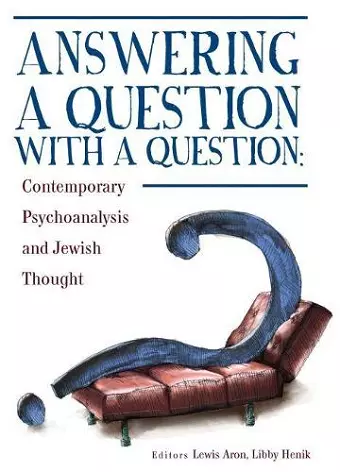Answering a Question with a Question
Contemporary Psychoanalysis and Jewish Thought
Lewis Aron editor Libby Henik editor
Format:Hardback
Publisher:Academic Studies Press
Published:30th May '10
Currently unavailable, and unfortunately no date known when it will be back
This hardback is available in another edition too:
- Paperback£20.99(9781618112996)

In the Jewish tradition, it is incumbent upon every generation to attempt to find meaning in its history. Meaning is co-created within the context of the inter-subjective field of a meeting of minds. Psychoanalysis, in some respects like the Jewish tradition from which it emerged, represents a body of thought about man’s relation to himself and to others, and places great value on the influence of memory, narrative, and history in creating meaning within the dyadic relationship of analyst and patient. In Answering a Question with a Question: Contemporary Psychoanalysis and Jewish Thought, editors Aron and Henik have brought together an international collection of contemporary scholars and clinicians to address the interface and the mutual influence of Jewish thought and modern psychoanalysis.
Long overdue, this sumptuous anthology of recent writings on the multiple interconnections between Judaism and contemporary psychoanalysis is endlessly illuminating. The range is indeed broad, from theology (God, of course), to biblical narratives (the Garden of Eden narrative), to ritual (shiva) on one side, and from Freud (of course) to Winnicott and Stephen Mitchell on the other. The scholarship is both impeccable and accessible to the general reader. A major contribution to both fields."âDr. Neil Gillman, Aron Rabinowitz and Simon H. Rifkind Emeritus Professor of Jewish Philosophy, Jewish Theological Seminary of America|"Freud famously had one foot in fin de siecle Vienna and the other in the world of his fellow Jews. His ambivalence about the gap between the Greco-Christian intellectual tradition of secular Vienna and his own Rabbinic tradition has been amply explored and documented. In this rich and original book, Aron and Henik bring these issues into the present. In keeping with relational and post-modern precepts, their effort is dialogic and intertextual; that is, it is not about Freudâs dilemma, but rather about exploring and extending contemporary mutual influences. Brilliant and enlightening, this book represents a wide and impressive spectrum of scholarship and will be of great value to anyone interested in the interface between Judaism, psychoanalysis and culture. So, whatâs not to like?"âEdgar Levenson, MD Fellow Emeritus, Training and Supervisory Analyst and Faculty, William Alanson White Institute|"Lewis Aron and Libby Henik have edited a fresh and intellectually challenging collection of essays. Each contributor has original insights into the history and practice of psychoanalysis, the fascinating question of Freudâs Jewishness, and the role of psychoanalysis in modern Jewish self-understanding.ââSusannah Heschel, Eli Black Professor of Jewish Studies, Dartmouth College|"Answering a Question with a Question: Contemporary Psychoanalysis and Jewish Thought, edited by Lewis Aron and Libby Henik, is a timely and welcome collection of essays by Jewish psychoanalysts exemplifying the whole range of Jewish denominations including ultra-Orthodoxy." --Carlo Strenger, Haaretz Despite Freud's disdain of religion, psychoanalysis was dubbed a 'Jewish science' by the Nazis among others. Edited by Aron (director, New York U. Postdoctoral Program in Psychotherapy and Psychoanalysis) and Henik (in private practice in New York and New Jersey), this collection brings together 14 essays offering wide-ranging perspectives on psychoanalysis in Jewish contexts. Following an overview of the historiography of scholarship in the field as a 'Jewish wisdom tradition,' US contributors examine topics including the interpretation of dreams, shiva (the Jewish mourning ritual), the Commandments, Garden of Eden narratives, transformation through mysticism or psychoanalysis, and anti- Semitism through theoretical formulations, clinical case examples, and biblical-type commentary. (Annotation ©2010 Book News Inc. Portland, OR)|"The editors of the thought-provoking book Answering a Question With a Question: Contemporary Psychoanalysis and Jewish Thought seek to look beyond Freudâs own Jewish heritage to an in-depth study of Judaism and Jewish studies as the foundation of psychoanalytic principles. The study and practice of psychoanalysis share a deep connection with the study and practice of Judaism. Although Freudâs concern was that the relationship between psychoanalysis and Judaism would lead to the demise of psychoanalysis, Lew Aron and Libby Henik set out to demonstrate how fundamentally entwined psychoanalysis is with Judaism... The answer to a question and the solution to a problem can come from a number of places. However many times a solution is offered, we may reject or obscure our understanding. Like the religious man and the patient in analysis, the reader must make his or her own meaning of the experience. The essays collected here provide a glimpse of two historic traditions. Through inquiry and exploration of the inner and outer world, both share that fundamental human desire to make meaning out of chaos and to bring a deeper understanding to what it means to be human.'' -- Michael B. Donner, PsycCritiques|âAron and Henik have assembled 14 thoughtful, well-researched essays, some of them pathbreaking, on the historical and intellectual imbrication of Jewish thought and modern psychoanalysis. . . . Particularly rich is the grouping on biblical commentary, which includes essays on the relation to psychoanalysis of rabbinic exegesis, Midrashic tradition, and biblical narrative. . . . This book will interest anyone concerned with the intellectual and cultural history of psychoanalysis and its implications for further speculation and therapy. Highly recommended.â âM. Uebel, University of Texas, in CHOICE: Current Reviews for Academic Libraries, December 2010
ISBN: 9781934843376
Dimensions: unknown
Weight: unknown
424 pages